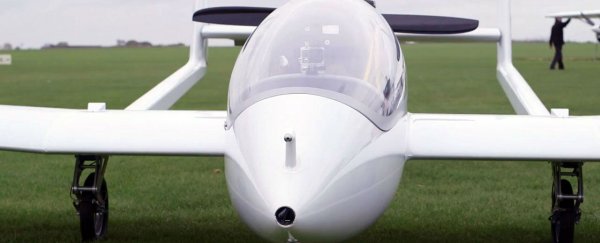The first big step towards more environmentally friendly commercial planes has been achieved by researchers in the UK, having successfully tested a hybrid aircraft that uses 30 percent less fuel than its petrol-only peers.
Air travel is one of the most environmentally damaging activities humans will ever do. Every day, 8.3 million people will fly around the world, which is double the amount of people flying back in 1999.
In the US, aircraft burned around 16.2 billon gallons of fuel between October 2013 and September 2014, and in the European Union, the greenhouse gas emissions from air travel increased 87 percent between 1990 and 2006. Right now, aircraft account for roughly 2 percent of all human-caused carbon emissions.
It's so bad, it's become something of an ethical dilemma for each of us. That's what American meteorologist Eric Holthaus said in a 2013 Quartz article, describing how he and his wife have chosen to never fly again:
"Last week, when a panel of the world's best scientists issued a new report on climate change, I did my best to read it like a meteorologist. The facts led to a simple conclusion: Humans cause global warming. And without an immediate and dramatic cut in carbon emissions, the problem could become irreversible.
My wife and I realised that the "substantial and sustained reductions" called for by the Intergovernmental Panel on Climate Change (IPCC) had to start with us. World governments will never agree in time to coordinate reductions in greenhouse gas emissions. If anything is to change, it will have to come from individuals taking ownership of the problem themselves."
 Credit: Quartz
Credit: Quartz
Holthaus describes how his annual air travel uses up half his annual household emissions - 33.5 metric tonnes of CO2. But what if we could fly in planes that use significantly less fuel?
Researchers from the University of Cambridge have teamed up with aircraft manufacturing giant, Boeing, to create a plane that's powered by a parallel hybrid-electric propulsion system. "The aircraft, a modified, commercially-available, lightweight single-seater, uses a combination of a four-stroke piston engine and an electric motor, which could also turn into a power generator," Federico Guerrini reports at Forbes. "The hybrid power system is based on a Honda engine; the batteries, a set of 16 large lithium-polymer cells, are located in special compartments built into the wings."
The aircraft requires most of its fuel when it's taking off and ascending, and that's where the petrol engine and electric motor work together to get it to heights of over 450 metres (1,500 feet). Once the plane is cruising comfortably at this height, the electric motor can be switched to either the generator mode, which recharges the batteries, or the motor assist mode, which helps keep fuel consumption down. It's the exact same system that's been powering hybrid cars since 1997, but, says Guerrini, the reason it's taken hybrid aircraft so long to, ahem, take off, is the battery technology hasn't been invented till now.
"Until recently, [batteries] have been too heavy and didn't have enough energy capacity," said one of the team, Paul Robertson from Cambridge's Department of Engineering, in a statement. "But with the advent of improved lithium-polymer batteries, similar to what you'd find in a laptop computer, hybrid aircraft – albeit at a small scale – are now starting to become viable."
According to Forbes, when the aircraft was tested at a Northhamption aerodrome, it used 30 percent less fuel than a comparable petrol-only plane. The downside? The battery was only able to sustain flight for several minutes, so the next big hurdle is improving the battery to support the hours-long flights we're all so painfully used to.
We're still decades away from electric airliners, Robertson said, but this new plane will provide an important testing ground for his team and other researchers who are hoping to bring the dream of greener air travel to reality. As the University of Cambridge reports, by 2050, international aviation emissions are expected to triple those of 2005 if things keep going the way they are.
"Our mission is to keep our sights on finding innovative solutions and technologies that solve our industry's toughest challenges and continually improve environmental performance," said Marty Bradley, Boeing's principal investigator for the programme, in a press release. "Hybrid electric is one of several important elements of our research efforts, and we are learning more every day about the feasibility of these technologies and how they could be used in the future."

Sources: Forbes, The University of Cambridge
